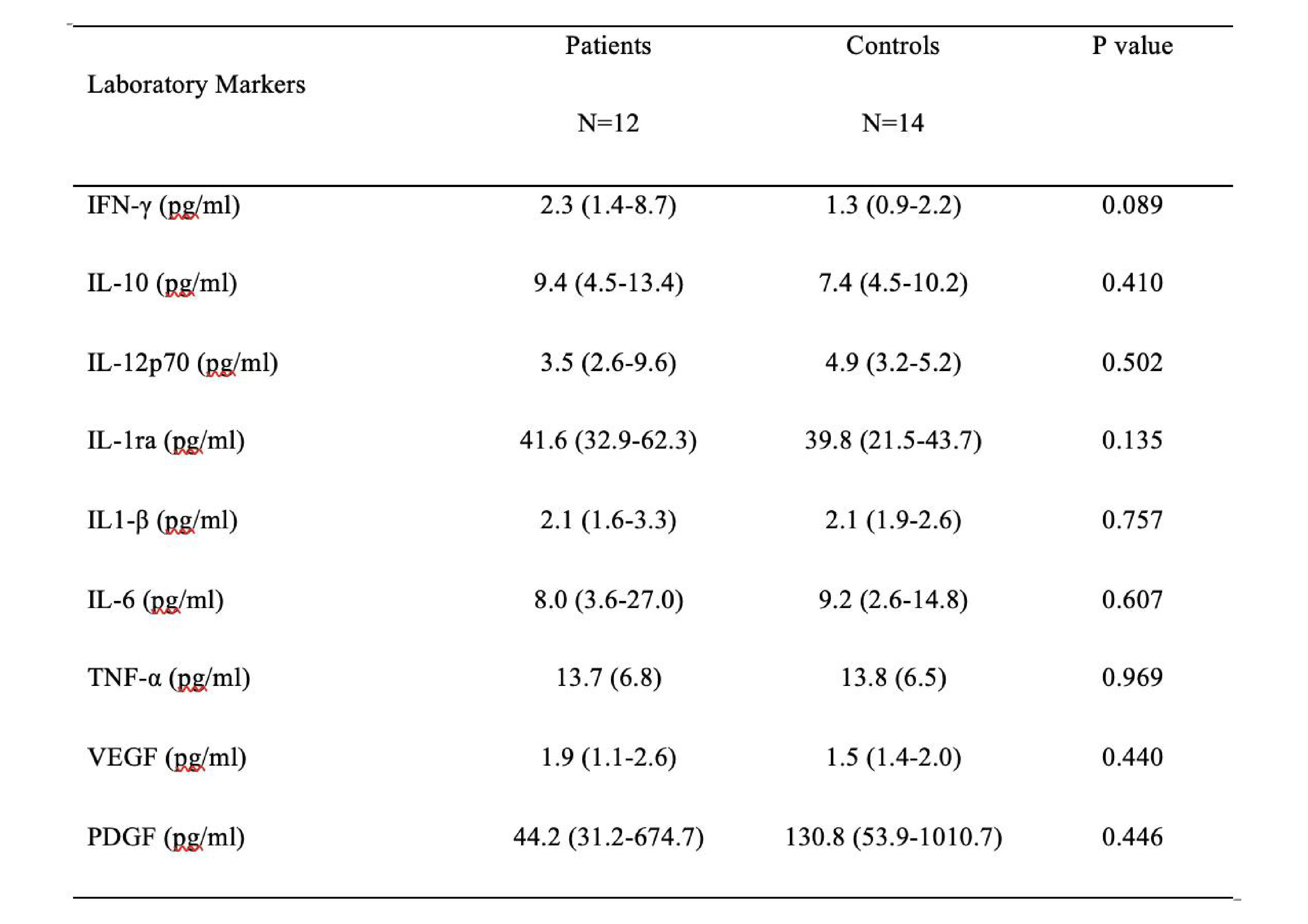Session Information
Session Type: Poster Session A
Session Time: 6:00PM-7:00PM
Background/Purpose: Biomarkers for disease activity in adult Takayasu arteritis (TA) have been studied exhaustively, but there are inconsistencies among the studies (1). Childhood-TA (c-TA) differs from adult TA in many aspects, including the high frequency of non-specific symptoms at disease onset, and a more pronounced inflammatory disease (2). Therefore, we aimed to assess the levels of serum cytokines as potential biomarkers for smoldering disease activity in c-TA patients undergoing treatment and considered in remission by clinical scores.
Methods: Cross-sectional study with c-TA patients recruited from three Brazilian reference centers in Pediatric Rheumatology. All patients fulfilled EULAR/PRINTO/PRES criteria and were in clinical remission according to Indian Takayasu clinical activity score (ITAS) 2010 and Paediatric Vasculitis Activity Score (PVAS) (3,4,5). Patients were two half lifetime periods off immunosuppressants, before blood sample collection. The following serum cytokines were measured: interferon gamma (IFN-γ), interleukin-10 (IL-10), interleukin-12p70 (IL-12p70), interleukin 1 receptor antagonist (IL-1ra), interleukin-1 beta (IL-1β), interleukin-6 (IL-6), tumor necrosis factor alpha (TNF-α), vascular endothelial growth factor (VEGF) and platelet-derived growth factor (PDGF). The control group consisted of 14 age- and sex-matched healthy individuals (HC).
Results: Twelve c-TA patients were recruited (66.7% females) with a mean age of 18.7 ±2.84 years, and a median follow-up time of 10 (7.0-11.8) years. Ten from 12 patients had high arterial FDG-uptake (visual score =3) revealed in PET/MRI performed at the same time of the blood collection in a previous study (6). All patients were under therapy: 7 (58%) were on biological therapy (4-infliximab, 2-adalimumab and 1-tocilizumab) associated with synthetic immunosuppressants. No significant differences in serum cytokine levels were observed between c-TA patients and HC (p >0.05) (Table). According to Hata classification, no differences in cytokine levels were found between patients presenting diffuse arterial involvement (i.e. angiographic type V) and localized disease (i.e. angiographic types I, IIa, and III) (7).
Conclusion: Similarly to adult TA, the investigation of biomarkers to detect smoldering disease activity is also a challenge in c-TA patients during follow-up, especially in those with long follow-up periods and under long-term immunosuppressants, independently of the extension of the disease. Further longitudinal multicenter and multinational studies, with a large number of patients, are necessary to better analyze biomarkers involved in disease progression in c-TA.
 Cytokine levels of childhood-onset Takayasu arteritis patients and healthy controls
Cytokine levels of childhood-onset Takayasu arteritis patients and healthy controls
To cite this abstract in AMA style:
Clemente G, Terreri M, Gualano B, Silva C, De Souza A. Are the Levels of Cytokines Good Biomarkers for Smoldering Disease Activity in Childhood-Takayasu Arteritis? [abstract]. Arthritis Rheumatol. 2023; 75 (suppl 4). https://acrabstracts.org/abstract/are-the-levels-of-cytokines-good-biomarkers-for-smoldering-disease-activity-in-childhood-takayasu-arteritis/. Accessed .« Back to 2023 Pediatric Rheumatology Symposium
ACR Meeting Abstracts - https://acrabstracts.org/abstract/are-the-levels-of-cytokines-good-biomarkers-for-smoldering-disease-activity-in-childhood-takayasu-arteritis/
